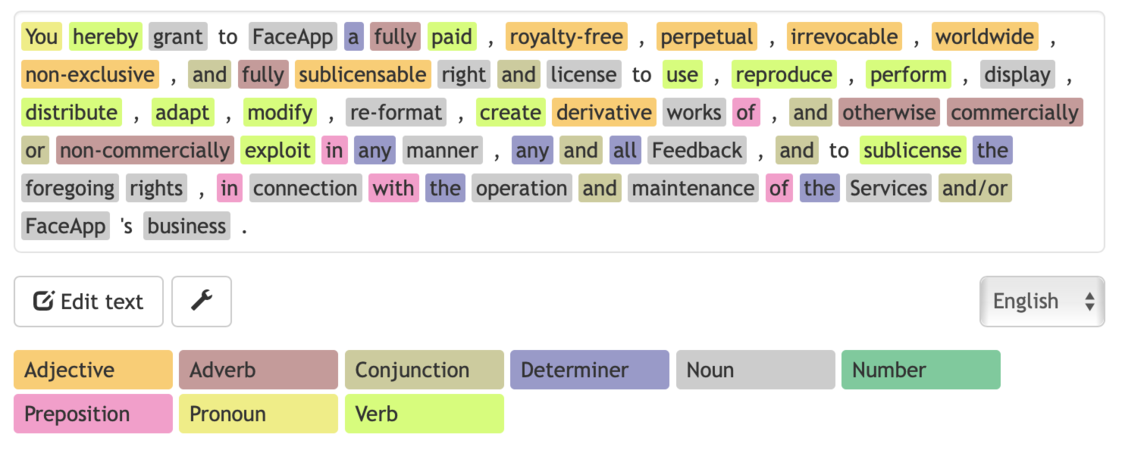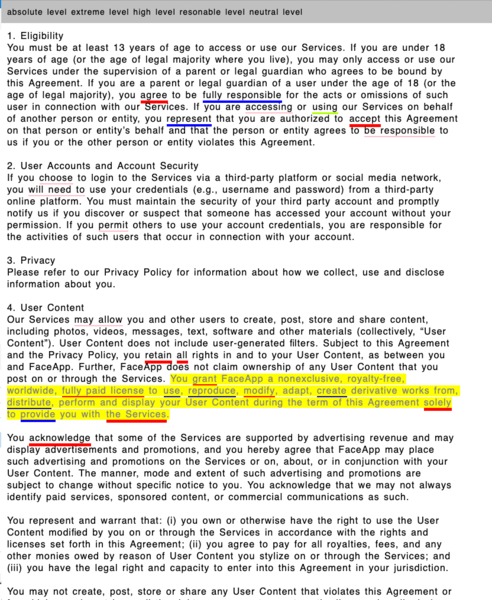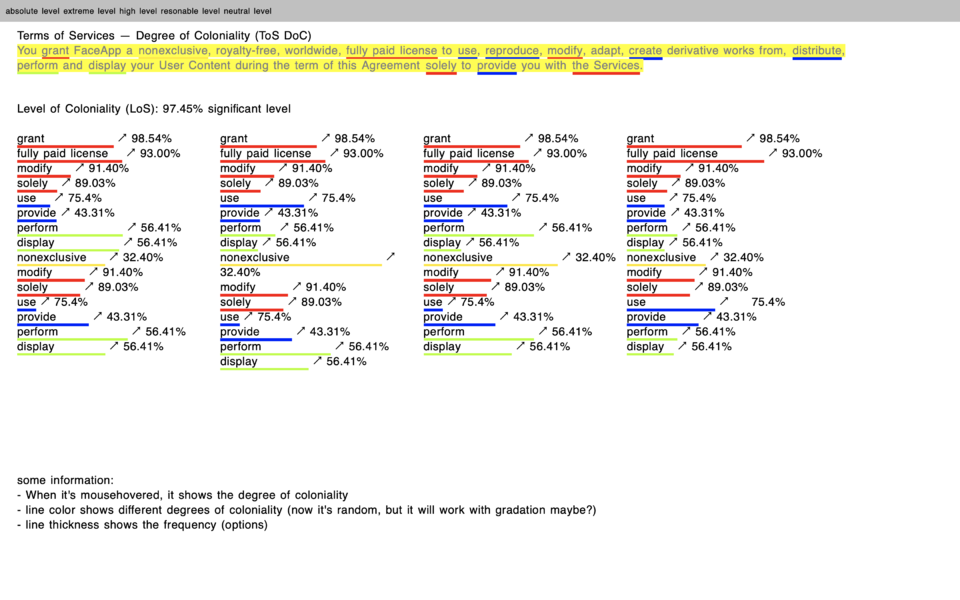User:Bohye Woo/Degrees of coloniality in Terms of Service
(title yet decided) — general description
I'm building a modern-colonial text publishing archive, a series of word analysis that reveals the modern-colonial contexts in 'Terms of Service (ToS)'. ToS is a modern working contract in digital colonial society, where big companies are dominating the power structures via ToS to deceive users. My project introduces how modern digital colonialism is showing in digital society by mapping out the whole architecture of language in ToS.
The role of my project
The role is to...
- contribute a platform of reading ToS. In doing so, it questions what does it mean to provide ToS in the digital corporate society.
- question. Questioning the concept of digital colonialism by providing visualization of ToS language as a modern-colonial tool to deceive users.
- analyse. Collecting ToS from major tech companies to investigate how particular terms are being used in the specific context of ToS. Because ToS platforms have different tones of voice, different words being used. How does the platforms have modern-colonial aspects in ToS?
- examine what is modern-colonial language by taking a closer look on words within the realm of ToS. This provides categorization of modern-colonial language into digital colonial glossary.
- archive. It is evident that not much of digital material will survive (Zelkowitz, 2003). Archiving is important in digital age as a preservation tool because of perpetual changes in digital platform. My project archives related informations about digital colonialism including news articles, videos, books, tweets ... to proffer knowledges I gleaned from the web. The archive will contain different analyzations on the modern-colonial words and contexts. (Advances in Computers: Information Repositoriesedited by Marvin Zelkowitz: https://books.google.nl/books?hl=en&lr=&id=xqvv7yqtr2kC&oi=fnd&pg=PA1&dq=importance+of+knowledge+archiving&ots=9NU6J-zv88&sig=2pkfx30iXkDgFS4-wLsqT9iVs8Y#v=onepage&q=importance%20of%20knowledge%20archiving&f=false)
Importance of language
Language is important because:
- Language as a colonial tool: Treaties in colonial times and ToS in modern time both are to control the power structure. it shows a way to indoctrinate/manipulate the colonize subject via ToS.
- Polarity of calming language: How specific words can play as colonial words? Using their comfort language become a colonial language. Comforting language for the company that are using highly polarized terms sometimes obfuscates or conceal users labour to deceive them.
- Language as a colonial waterway: Shiproute in colonial times that used to sail to exchange/extract/export the goods. Language itself as a medium by which to interface with the colonizer.
DoCiToS — Process
Tools
1. The Semantic MediaWiki extension allows for managing structured data in my wiki and for querying that data to create dynamic representations into timeline based website. (https://www.semantic-mediawiki.org/wiki/Semantic_MediaWiki)
2. NLTK will help to analyse and categorise the words from ToS.
- NLTK website http://www.nltk.org/
- NLTK Book: https://www.nltk.org/book/ / https://www.strehle.de/tim/weblog/archives/2015/09/03/1569
3. Pattern is a web mining module for the Python programming language. A Python script 'Modality.py' is written in Pattern, it it a rule-based text mining program.
- Pattern https://www.clips.uantwerpen.be/pages/pattern/
- Modality.py https://github.com/clips/pattern/blob/master/pattern/text/en/modality.py
A list of Terms of Services
These companies are officially not a colony, but in a pratical term: a colony. There is a relationship that is unfair regardless what their intention is.
PokemonGo: https://www.pokemon.com/us/privacy-notice/
TikTok: https://www.tiktok.com/legal/privacy-policy?lang=cn#privacy-row
Snapchat: https://www.snap.com/en-GB/privacy/privacy-policy/ / https://www.snap.com/en-GB/terms/
FaceApp: https://www.faceapp.com/privacy-en.html / https://www.faceapp.com/terms-en.html
Netflix: https://help.netflix.com/legal/termsofuse / https://help.netflix.com/legal/privacy
Amazon: https://www.amazon.com/gp/help/customer/display.html?ie=UTF8&nodeId=468496&ref_=footer_privacy / https://www.amazon.com/gp/help/customer/display.html?ie=UTF8&nodeId=508088&ref_=footer_cou
Sony - Aibo: https://us.aibo.com/terms/aibo-privacy.html
FaceBook
Instagram
How to categorise colonial words?
STEP 1
Using a Standford Log-linear Part-Of-Speech Tagger in NLTK. A Part-Of-Speech Tagger (POS Tagger) is a piece of software that reads text in some language and assigns parts of speech to each word (and other token), such as noun, verb, adjective, etc. (https://nlp.stanford.edu/software/tagger.shtml)
The list of part of speech
- MD = would, could...
- RB = adverb 'very', 'slightly'...
- VB = verb
- JJ = adjective 'big'...
- NN = noun
- CC = coordinating conjunction 'and', 'or'...
- PRP = personal pronoun 'I', 'he', 'she'...
... more and more
STEP 2
When it's first categorized, I will establish sub-categories into the degree of coloniality. This step is to calculate a degree of coloniality with a value between 0,00% to 100,00%.
degree of coloniality (gradation of intensity words)
100.00 = absolute level of coloniality
90.00~ = extreme level of coloniality
80.00~ = heavy level of coloniality
70.00~ = high level of coloniality
60.00~ = significant level of coloniality
50.00~ =
40.00~ = relative level of coloniality
30.00~ = moderate level of coloniality
20.00~ = reasonable level of coloniality
10.00~ = fair level of coloniality
0.00~ = neutral level of coloniality
Example
The word 'may' has approximately 10%, 'change' has 70%, and 'must' has in a range between 90% level of coloniality.
epistemic_VB = { #verbs from FaceApp ToS
90.00~ : d("must", "agree","use"),
80.00~: d("use", "bound", "access", "allow", "acknowlegde", "reproduce"),
70.00~: d("choose","claim", "permit", "collect" ),
60.00~: d("change"),
50.00~: d("create"),
40.00~: d("maintain"),
30.00~: d("support"),
20.00~: d("identify"),
10.00~: d("may"),
0.00~: d(),
}
Project overview
Reference
https://www.cnet.com/how-to/amazon-and-google-are-listening-to-your-voice-recordings-heres-what-we-know/
https://www.cnet.com/news/faceapp-says-its-not-uploading-all-your-photos/
https://twitter.com/rycrist/status/1151479283661115392
FaceBook https://www.wired.com/story/faceapp-privacy-backlash-facebook/
Aibo https://www.cnet.com/news/yes-the-robot-dog-ate-your-privacy/



